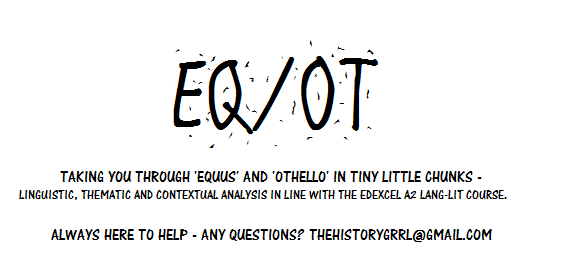Equus as a play is wrought with religious lexis and references, and has, by some critics, been seen as an allegory for and parody of Christianity.
Equus as an allegory
- Alan is confused; he has been brought up memorising Biblical passages, mostly related to horses, and has thus confused Christ with Equus.
- This begins with the first time Alan rides a horse, and continues through until his Father takes the painting of Christ from him, eventually replacing it with a face-on photograph of a horse, showing his replacement of conventional religion with the religion he, himself, has created.
- This is demonstrated through his repeated use of biblical lexis when referring to Equus.
Biblical lexis in reference to the "character" of Equus
- Holy of Holies – the stable, his “temple” (spoken by Dysart, but agreed to by Alan)
- Begat – Alan creates a ‘parody’ of traditional Biblical ‘family tree’ – leading, traditionally, to the birth of Christ
- “Behold, I give you Equus, my only begotten son” – evidently, this would traditionally refer to Jesus; as the Nicene (Roman catholic) creed pronounces “We believe in one Lord, Jesus Christ, the only Son of God, eternally begotten of the Father” -- it seems likely that this is where Alan received these ideas
- “His last supper” – Dysart seemingly misses this reference to the Bible, asking only “last before what?”; however the way Alan uses this phrase shows his contorted understanding of religion
- While with Equus, many of Alan’s other utterances appear to be contortions of the Nicene creed; for example “I want to be you forever and ever” could be derived from “one God, forever and ever”
Sacrifice
Alan’s reference to the “last supper” links in to what some critics see as Alan’s sacrifice of “his Christ”;
- Christ was sacrificed on the cross to “take away the sins of the world”
- When Alan blinds the horses, already seen to be ‘his Gods’, he is doing so to relieve himself of the sins he has committed in their presence
- “The sadomasochistic act covers his need to obliterate his judge and to crucify his Christ.” – Mitchell Hay
Dora's influence
“The Book of Job. Such a noble passage, you know?”
- use of the tag question suggests that Dora believes everyone to know such biblical passages – demonstrating how Alan has such a detailed knowledge of them (enough so to contort them for his own purposes)
- use of the adjective “noble” shows the extent to which Dora believes the passage, and demonstrates the reverence her family had for horses (“we’ve always been a horsey family”)
“Sex is not just a biological matter. It is spiritual as well”
- Dora uses declarative statements here, demonstrating her clarity in her beliefs, and insinuating that she has passed them on to her son as fact. This contorts Alan’s beliefs and can be seen as having eventually lead to his ‘passion’ for horses.
Parental conflict
Dysart: “If there is any conflict over religion, it should be evident on a Sabbath evening”
- use of the more biblical word ‘Sabbath’ as opposed to ‘Sunday’ shows the strength with which Dysart believed Religion to be a cause of tension; everyone knows that Sunday is the Christian “day of rest”, however it tends to be ignored – those who refer to it as the “Sabbath” are more likely to have stronger religious leanings
Relevance
Religion is also a good way to contextualise easily in 'Equus', where genuine historical context is harder to find and easily relate to the text. Biblical lexis and references can show the restraint placed on characters, for example in line with January 2010's question regarding "Hostile Worlds", where religious repression could be seen in this way - where even Alan's God is hostile towards him.
It can also easily fit into the categories of sexual ethics and parental relationships (see "Dora's influence"), and can be added 'casually' in in many circumstances, as Alan's unique understanding of religion makes him truly an individual in society.
Questions? As ever, ask! :)
- HistGrrl x
Monday, 7 June 2010
Context: Religion in 'Equus'
Labels:
Alan,
AO1,
AO3,
context,
Dora,
Dysart,
equus,
hostile worlds,
parental influence,
religion,
sexual ethics
Subscribe to:
Post Comments (Atom)

No comments:
Post a Comment